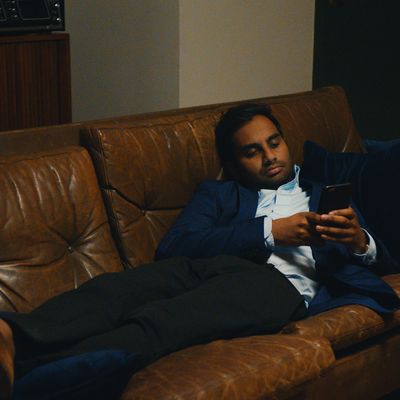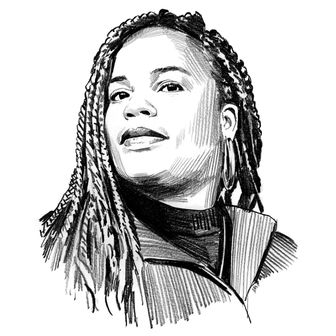
Of course a show about a 30-something single man — one who lives and dates in Brooklyn, who likes Father John Misty, eats tapas, and visits Storm King on the weekends — was going to have to take on Tinder. There’s just no way to discuss modern romance without a lengthy discussion of dating apps. And, on Aziz Ansari’s Master of None, that lengthy discussion takes the form of “First Date,” the fourth episode of the show’s second season.
In an hour-long montage of first dates, the episode attempts to show viewers what dating in 2017 looks like, offering up a concentrated look at how apps have shaped our love life. “First Date” has emerged as an early favorite among the binge-watchers I spoke to — which is probably unsurprising, given that recognition and relatability have always been among the show’s pleasures. The same way a New York viewer can shout, “I go there!” at nearly all Master of None’s filming locations, we can all yell, “That weird thing happened to me too!” at its brutally familiar depiction of app dating. Name a bad Tinder date, exchange, or type of dick pic you’ve received and there’s a chance that it’s addressed in this episode.
“First Date” begins with various women browsing Love at First Sight (as the show’s version of Tinder is called) in various locations — at bars, with friends, on the toilet (accurate). At some point all of them happen upon the profile of Ansari’s hero, Dev, and if they match, Dev sends his standard opener: “Going to Whole Foods. Want me to get you anything?” (A one-size-fits-all opening line: also accurate.) Then comes the one-size-fits-all date: wine and dinner at the Four Horsemen, followed by drinks at a rooftop bar, and a cab ride home/attempted hook-up. (Accurate. Who doesn’t have a preferred route home, so to speak?) Dev is then rejected for any number of reasons: Not that into you, just looking for new friends, just want to be friends, no free time, “eh.” (All accurate.) Once, he has sex with someone even though he finds her to be truly vile and mildly racist — no judgment, we all know it happens.
The episode invites the viewer to nod and commiserate. Have you ever checked Tinder during your date to set up another date because the current date was so bad? Are you a person of color who routinely gets ignored on apps? Did someone go do coke in the bathroom during your date — wait, was it you? Have you sent or received a dick pic? Have you been rejected as often as you blink? You are represented here. How does it feel?
Well, if I’m being totally honest, it feels just a little boring. Because, at this point, the only thing more familiar than all the annoying things about Tinder is complaining about all the annoying things about Tinder. We know! Tinder sucks!
Master of None has always excelled at turning a keen, almost anthropological lens on the habits of a certain new yuppie demographic: the self-aware way in which they work, live, and try to bone, as well as the painfully hip places where they do it. “First Date” takes that tendency to a new level — Ansari has already literally written the book on this stuff. In 2015, he published Modern Romance: An Investigation with sociologist Eric Klinenberg. The book was a funny data-driven exploration of dating in digital times — a portrait of how we date now, why it’s bad (too many choices), and how to make it better (plan non-boring-ass dates, for starters). It was part comedy, part sociology, and drove home the central thesis that app-reliant dating is sort of bad, incredibly frustrating, and mostly unfulfilling. “First Date” seems like a mash-up of the hundreds of anecdotes Ansari collected for it. And, as a result, instead of a incisive, mildly enlightening look at dating today, the episode is an encyclopedia of Tinder Sucks in sitcom form. And worse, one that hasn’t been updated since Ansari wrote the book a few years ago.
How quaint to remember when someone using the app to “just find friends” was the most annoying problem! In place of the laundry list of well-worn complaints depicted on “First Date,” 2017 Tinder offers a world of new problems. First, and most importantly: open relationships. How did this episode miss the best bad thing about Tinder? There are comedic gems to be had in the exchanges between people explaining the ethics and extensive rules and complications of their open relaysh, while you’re just trying to meet up for a beer.
Other fun new things: the increase in couples who have abandoned Feeld (formerly, Thrinder) and come to Tinder to seek their unicorn (and not of the Frappuccino variety). And what about all the god-awful conversations about politics? The exchanges that start out with a shared love of Kendrick Lamar and end with a conversation about Trump that’s so depressing you definitely don’t want to fuck the person you’re speaking to, if anyone at all, ever again? And then there’s the experience of rematching with the same human, multiple times. And also all those people who are in town from Turkey and want to use you as a tour guide, or worse, a crash pad. All preferable to the dreaded moment where you literally run out of Tinder, which seems to happen only on the most hung-over, self-loathing of Sunday afternoons.
Given that Ansari is such a sharp observer of how his peers think and act and date, it was hard not to wish he’d gone beyond the obvious pitfalls — or at least wish that the list of woes felt more current. Tinder is so widely normalized at this point that it no longer feels like a novelty, and it’s affected dating in ways beyond uninvited genitalia and cliché opening lines.
What makes a show’s diagnosis of modern romance stand out is the ability to articulate something no one else quite has yet — to identify previously uncharted trends and behaviors. It’s a feat that Sex and the City and How I Met Your Mother and even sometimes Girls managed from time to time. These shows still contain light-bulb moments of “oh god that is happening to me,” because they were crafted in a way that always felt enlightening and surprising.
To his credit, Ansari is in a difficult position — the speedy, digital, social-mediated world he’s chronicling makes it harder than ever to capture this kind of pop anthropology. The quirks of our tech lives go from news to meme to cliché faster than a TV-production calendar can capture — for example, we’ve gone from “ghosting” to “breadcrumbing” in less time than it takes to actually ghost (breadcrumb?) someone. Still, give me an episode that adds some surprising cultural commentary about the ubiquitous scourge of Tinder, not one that makes me feel bad about using Tinder on the toilet — even if everyone does it.


